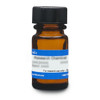Neratinib is a quinoline derivative. It acts as a tyrosine kinase inhibitor and has anticancer properties. Neratinib has shown benefit for HER2 positive breast cancer and non-small cell lung cancer.
| Mechanism of Action | Neratinib is a dual inhibitor of human epidermal growth factor receptor 2 (Her2) and epidermal growth factor receptor (EGFR) kinases with similar potency, and the inhibition is irreversible. It targets a cystine residue in the ATP binding pocket of the receptor. It can induce cell cycle arrest and decrease cell proliferation. The inhibition is irreversible. |
| Eukaryotic Cell Culture Applications | Solid tumors naturally grow in 3D, thus 3D cell culture may mimic the natural in vivo setting better than traditional monolayer (2D) cell culture. Using HER2-positive breast cancer cell lines (BT474, HCC1954, EFM192A), the effects of culturing cells in 3D versus 2D was assessed. Authors found that 3D cultures were more resistant to the effects of Neratinib, which may be facilitated by altered receptor proteins, drug transporters and metabolizing activity. The study highlights the importance of considering 3D in addition to 2D culture methods in pre-clinical studies of both newer targeted and more traditional anti-cancer drugs. (Breslin and O’Driscoll, 2016). |
| Cancer Applications | In vitro cell proliferation assays with mouse fibroblast line 3T3, 3T3/neu, epidermal carcinoma cell line A431, HER-2 overexpression breast cancer cell line SK-Br-3, HER-2 overexpression breast cancer cell line BT474, breast cancer cell line MDA-MB-435, colon cancer cell line SW620, HER-2 -overexpressing human ovarian carcinoma cell line SK-OV-3 were conducted with Neratinib (0.5 ng/ml–5 μg/ml dilutions). The compound repressed proliferation of 3T3, A431,SK-Br-3 and BT474 cell lines ((Rabindran et al, 2004). In vivo studies of tumor cells implanted in flanks of nude mice. Treatment was initiated after tumors had reached a size of 90–200 mg, Neratinib treatment repressed tumor growth when administered to animals between 10 mg/kg/day and 40 mg/kg/day. Maximum inhibition was seen at 40 mg/kg/day. No compound-related toxicity was observed (Rabindran et al, 2004). Cancer cells may elude chemotherapy in a number of ways,and share the ability to become resistant. A common resistance mechanism is the overexpression of cell membrane-bound ATP-binding cassette (ABC) transporters and the overexpression of ABCB1 protein. In vitro studies with the following cell lines: human breast carcinoma MCF-7, human oral epidermoid carcinoma KB, human leukemia HL60, human primary embryoinic kidney HEK293, and their ABCB1 -overexpressing derivatives were conducted. In cell xenographs, Neratinib augmented the effect of chemotherapeutic agents on inhibiting the growth of ABCB1-overexpressing primary leukemic blasts. Authors demonstrated Neratinib can reverse ABCB1-mediated multidrug resistance in vitro, ex vivo and in vivo by inhibiting its transport function (Xhao et al, 2019). |
| Solubility | DMSO (2 mg/mL) with warming; very poorly soluble in ethanol; very poorly soluble in water |
| References | Breslin S and O'Driscoll L (2016) The relevance of using 3D cell cultures, in addition to 2D monolayer cultures, when evaluating breast cancer drug sensitivity and resistance. Oncotarget 7(29):45745-45756 PMID 27304190 Rabindran SK (2004) Antitumor activity of HKI-272, an orally active, irreversible inhibitor of the HER-2 tyrosine kinase. Cancer Res. 64(11):3958–3965 PMID 15173008 Zhao X et al (2019) Neratinib (HKI-272) reverses ABCB1-mediated chemotherapeutic drug resistance in vitro, in vivo and ex vivo. Molec. Pharmacol. 95(3) mol.111.076299 |



